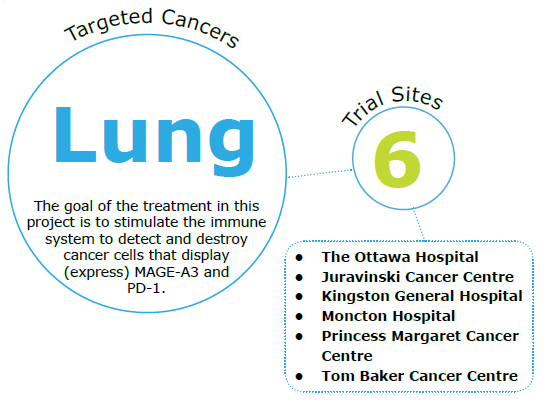Oncolytic MG1-MAGEA3 With Ad-MAGEA3 Vaccine in Combination With Pembrolizumab for Non-Small Cell Lung Cancer Patients
Key Information
Who may qualify?
- Patients with advanced solid-tumour cancers that express the tumour antigen MAGE-A3 and have failed to respond to conventional therapies
- See complete qualification guidelines by clicking the link below
Recruitment status
- Not recruiting (closed)
Key words
- AdMA3, MG1MA3, PD-1, Pembrolizumab, checkpoint inhibitor antibodies, MAGE-A3

About the Trial
Ad-MAGEA3 is a new type of virus vaccine made of an adenovirus (a common virus) with the addition of the MAGE-A3 tumour antigen. It has been altered so that it cannot reproduce. The human body will respond to the vaccine by producing an immune system reaction against the MAGE-A3. This is called “priming” the immune system.
MG1-MAGEA3 is a new oncolytic virus (designed to infect only cancer cells) made of a MG1 Maraba virus with the addition of the same MAGE-A3 tumour antigen. This virus has the capability to reproduce and has been altered so it will travel to tumour cells, reproduce within them and kill them. MG1-MAGEA3 will not reproduce in or kill healthy cells. In pre-clinical studies, done in cells and animals, it has been shown that MG1-MAGEA3 will further increase the immune system’s reaction against tumour cells that is started by Ad-MAGEA3 virus administration. This is called “boosting” the immune system.
Cancer cells sometimes have unique molecules (antigen) present on their surface, which can be targeted by vaccines. In this study, the adenovirus vaccine (AdMAGE-A3) and the Maraba MG1 virus (MG1MAGE-A3) have been altered in the lab to target an antigen called MAGE-A3. This MAGE-A3 antigen is found in a wide variety of cancers, including non-small cell lung cancer, but is not found in most normal tissue, making MAGE-A3 a good target for cancer therapies such as vaccines.
Pembrolizumab is a drug which increases the ability of the body’s immune system to attack tumour cells. It is an antibody and works by finding and binding to a protein on immune cells called PD-1, thereby blocking PD-1 binding to another protein called PD-L1. It is thought that these drugs are most effective when an anti cancer immune response already exists. Since treatment with the AdMAGE-A3 plus MG1MAGE-A3 has been shown to cause an anti-cancer immune response, this makes combining the oncolytic vaccine with Pembrolizumab a promising option.
Pembrolizumab will be given along with AdMAGE-A3 and MG1MAGE-A3.
(https://bit.ly/2R9vR1G)
Clinical Trial #: NCT02879760

